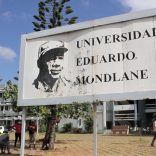MSF: Violence in Cabo Delgado sparks new wave of mass displacement as needs surge
Deutsche Welle Mozambique correspondent is at liberty waiting trial

DW ( File photo) / Arcénio Sebastião
DW correspondent Arcénio Sebastião was released from prison on Friday 11 November, after bail of 20 thousand meticais (EUR 230) was posted. He is accused of defamation, punishable by up to one year in prison.
Arcénio Sebastião was investigating unlawful fines at a weighing checkpoint in Sofala province’s Dondo district. He returned to the site to ask for clarification and would have been aware of other alleged illegal charges levied by the authorities on hauliers.
“I positioned myself about 200 metres from the weighing station and questioned every truck that went through, especially those going to Angola, Zimbabwe, Zambia, Malawi and Uganda. They said thatthey were regularly fined illegally or had money extorted,” the journalist says.
“When at the weighing station, I caught a natural resources protection police officer in the act of receiving money and I talked to a dispatcher who told me that he was paying two thousand meticais. He had six trucks coming from Caia transporting wood to the port of Beira. The officer charged two thousand meticais [per lorry] for them not to undergo legal inspection.”
The police officer noticed what Arcénio Sebastião was doing and did not like it. He even tried to confiscate the journalist’s equipment. The reporter was sent to the checkpoint supervisor who, however, saw no problem in the journalist’s work.

Even so, the DW Africa correspondent was then taken to the Dondo district command of the Republic of Mozambique Police (PRM) with the intention, according to him, of removing his equipment to sabotage his work.
In which enterprise they failed, because “as I walked with them [the agents], I took the memory card out of my tape recorder and put it in my mouth. The memory card was with me the entire 34 days in the cells”.
Arcénio Sebastião is accused of defaming the police by calling them corrupt. He was brought before an investigating judge within 48 hours and his arrest validated. He was released on Friday 11 November after payment of bail of 20,000 meticais (EUR 230) and is awaiting trial for defamation, punishable with imprisonment of up to one year.
Prevented from receiving visitors
During the time he was detained, Arcénio Sebastião was prevented from receiving visitors. “The days I spent in jail were the most boring days I’ve ever spent in my life. I was subjected to inhuman conditions, which were uninhabitable,” he says. The worst of it was that he “had practically no right to visitors, no right to communicate with anyone”.
Lawyer Joaquim Tesoura says that forbidding contact with the outside world was illegal. “When a person is detained, without a judge prohibiting contact with the outside, such contact cannot be forbidden. Neither the prison nor any other institution has any right to prevent or prohibit contact with the outside world. In fact, simply because of the nature of the crime, there was no need to prevent him from communicating with anyone,” he says.
Joaquim Tesoura also finds it strange that Arcénio was held for 34 days without trial, but the main irregularity “is the charge of defamation leading to detention or imprisonment. It’s not common,” he says. “We have the case of Castel-Branco (who was accused of defamation, libel and slander) but was nevertheless not detained. He was free pending trail and remains so to this day.”
Police stand by accusations against the journalist
Spokesman for the provincial PRM command in Sofala Daniel Macuácua accused the journalist of not having presented himself officially and of having maltreated officers of the authority.
“At the level of the provincial command, this journalist at no time gave information that he would be working in the weighing checkpoint,” Macuácua says, adding that “he then began insulting officers, addressing them in less than favourable words terms, and accusing them of being corrupt”.
The trial is now in the preparatory instruction stage. If convicted of defamation, Sebastião could spend up to a year of prison.













Leave a Reply
Be the First to Comment!
You must be logged in to post a comment.
You must be logged in to post a comment.